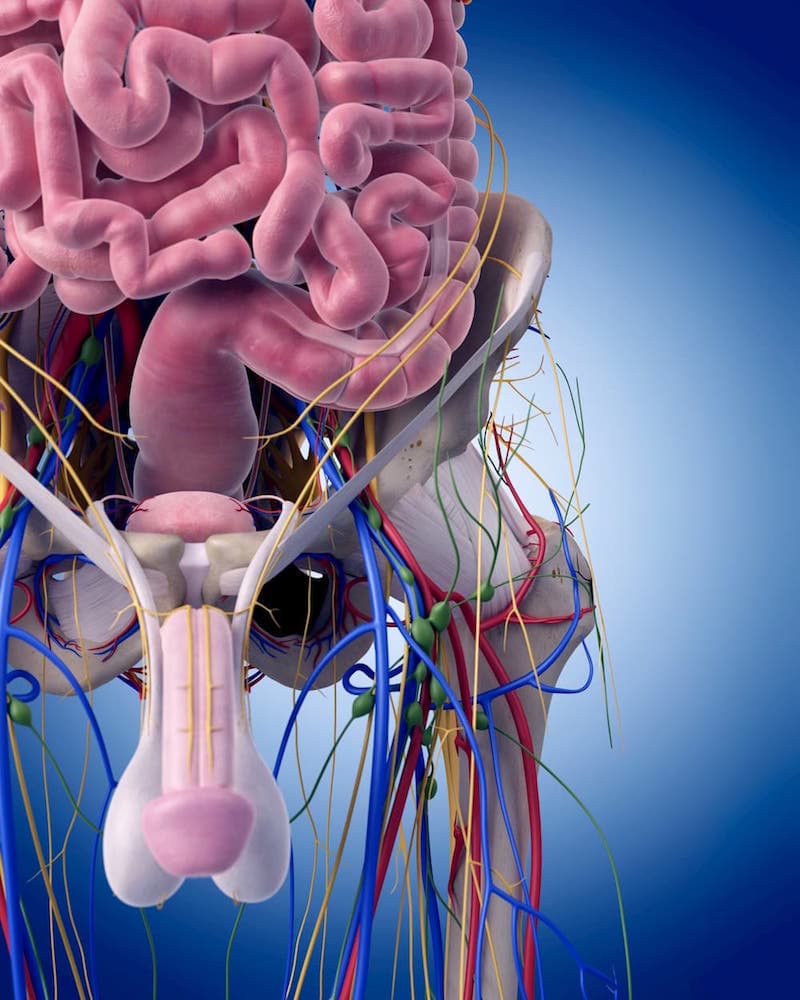Back
How Chronic Pelvic Congestion in Men Contributes to Prostatitis
By Shannon Strauch, PTA, STMT-1 on 12/11/2024

How Chronic Pelvic Congestion in Men Contributes to Prostatitis
Chronic pelvic congestion is a condition in which the veins in the pelvic region become dilated and inefficient at returning blood to the heart. This can lead to blood pooling in the pelvic area, resulting in inflammation, pressure, and dysfunction of nearby organs, including the prostate. It is often associated with
chronic prostatitis/chronic pelvic pain syndrome (CP/CPPS)
, a form of prostatitis not caused by infection but by inflammation, muscle tension, or other non-bacterial factors.Mechanisms Linking Chronic Pelvic Congestion to Prostatitis
Impaired Venous Drainage
:The prostate is highly vascularized, relying on efficient venous drainage to remove waste and maintain healthy tissue.
Pelvic venous congestion leads to stagnation of blood flow, increasing pressure in the pelvic veins, which can irritate and inflame the prostate gland.
Prostate Inflammation
:Blood stasis in the pelvis promotes local inflammation. Cytokines and inflammatory mediators may accumulate, leading to swelling and discomfort in the prostate.
Chronic inflammation can exacerbate pain and symptoms commonly associated with prostatitis.
Increased Pelvic Pressure
:Pelvic congestion raises intrapelvic venous pressure, which may compress the prostate and surrounding structures, causing pain, urinary symptoms, and sexual dysfunction.
Nerve Irritation
:The engorged pelvic veins can press on surrounding nerves, such as the
pudendal nerve
, contributing to neuropathic pain and hypersensitivity in the pelvic region.
Muscle Tension and Dysfunction
:Chronic congestion may cause compensatory tightening of the pelvic floor muscles, leading to myofascial pain, urinary symptoms, and difficulty with bowel movements.
Reduced Oxygenation
:Congestion limits efficient blood exchange, reducing oxygen delivery to the prostate and pelvic tissues. This hypoxia can impair tissue health and increase susceptibility to inflammation and dysfunction.
Symptoms of Chronic Pelvic Congestion Contributing to Prostatitis
Men with pelvic congestion may experience symptoms overlapping with prostatitis, such as:
Pelvic Pain
: A deep, dull ache in the lower abdomen, perineum, or scrotum.
Urinary Symptoms
:Increased urgency or frequency.
Weak urine stream or difficulty initiating urination.
Sexual Dysfunction
:Pain during or after ejaculation (dysorgasmia).
Reduced sexual satisfaction.
Chronic Discomfort
:Pain that worsens after prolonged standing, sitting, or physical activity.
Factors That Aggravate Pelvic Congestion and Prostatitis
Sedentary Lifestyle
:Prolonged sitting increases pressure on pelvic veins, worsening congestion.
Stress
:Chronic stress contributes to muscle tension, further impairing pelvic circulation.
Obesity
:Excess weight puts pressure on pelvic structures, exacerbating venous insufficiency.
Venous Valve Dysfunction
:Weak or damaged venous valves allow blood to pool in pelvic veins.
Treatment Strategies
Managing chronic pelvic congestion and its effects on prostatitis involves a combination of lifestyle changes, medical interventions, and targeted therapies:
1.
Lifestyle Modifications
:Regular exercise to promote venous return.
Avoid prolonged sitting or standing.
Weight loss to reduce pressure on pelvic structures.
2.
Medical Interventions
:Venotonic Medications
: Drugs like diosmin or micronized purified flavonoid fractions (MPFF) improve vein function and reduce congestion.
Anti-inflammatory Medications
: NSAIDs can reduce inflammation in the prostate and pelvic region.
3.
Physical Therapy
:Pelvic Floor Therapy
: Addresses tightness or dysfunction in the pelvic muscles.
Myofascial Release
: Improves circulation and relieves tension in the pelvic area.
4.
Minimally Invasive Procedures
:Pelvic Vein Embolization
: A procedure to block dilated pelvic veins, reducing venous congestion and alleviating symptoms.
Sclerotherapy
: Injection of a substance to collapse dysfunctional veins.
5.
Stress Management
:Mindfulness, yoga, or deep breathing exercises to reduce stress and associated pelvic muscle tension.
Prognosis and Prevention
Early intervention in managing chronic pelvic congestion can prevent long-term complications, including chronic prostatitis. By addressing both venous insufficiency and associated pelvic floor dysfunction, men can achieve better symptom control and an improved quality of life.
Conclusion
Chronic pelvic congestion significantly contributes to the development and persistence of prostatitis by impairing venous drainage, increasing inflammation, and exacerbating pelvic muscle dysfunction. A comprehensive approach that combines medical treatment, physical therapy, and lifestyle modifications is key to effective management.
Read More:
How Chronic Pelvic Congestion in Men Contributes to Prostatitis By Shannon Strauch, PTA, STMT-1 on 12/11/2024 How lymphatic issues can cause symptoms of prostatitis Prostatitis and Tight Pelvic Floor Muscles: A Comprehensive Guide By Shannon Strauch, PTA, STMT-1 on 12/10/2024 How a tight pelvic floor can be the reason for prostatitis symptoms
Are you ready to live pain free?
Request An Appointment